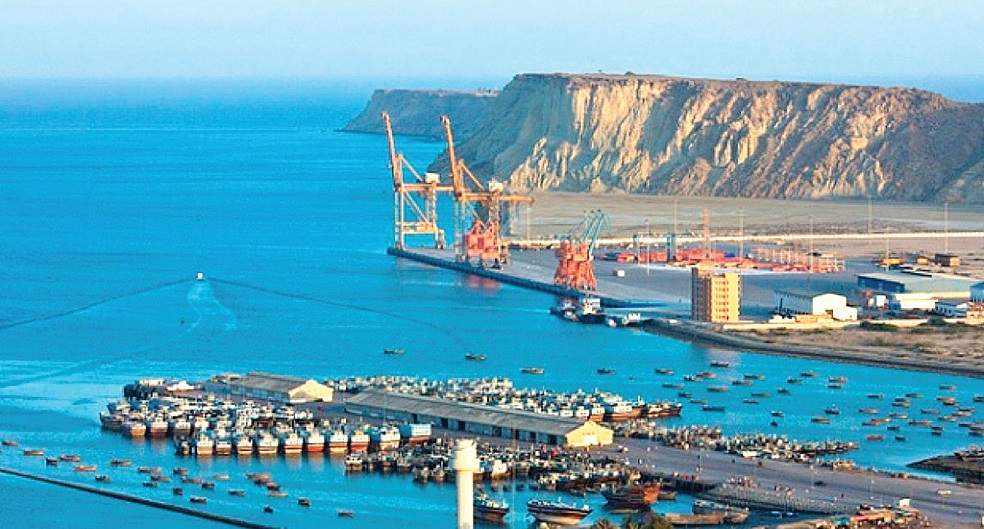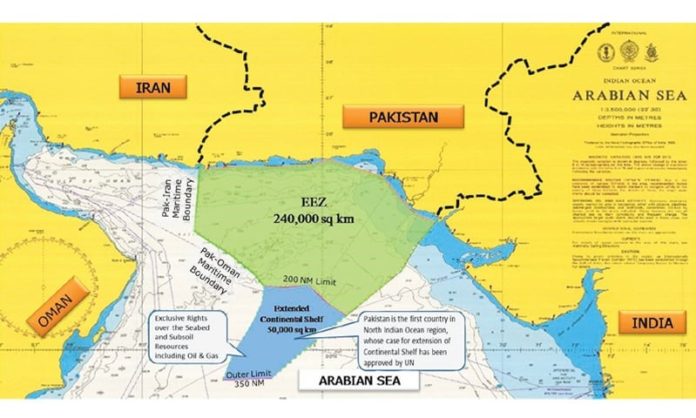Pakistan’s EEZ and extended continental shelf constitutes over 35% of its land and it has a sea front of more than 1000 kilometers. Nearly 90% of our trade by volume and 70% by value is carried out through the sea, yet the maritime sector has not been adequately exploited for accrual of optimal benefits and advantages. One important reason from amongst many for this failure is that maritime issues are not high on the national strategic thinking.
The oceans are rich in living and non-living resources and can generate wind, tidal, thermal and biomass energy. It is also a major source of food and an avenue for livelihood in such industries as fisheries, tourism, ports, shipping and ship building, to name a few. Pakistan’s exploration in these areas for its economic development has been far from satisfactory. In recent times pursuit of economic activity in maritime sector has been called Blue Economy after the term was first mentioned by Gunter Pauli, a self-styled entrepreneur of Belgian origin, who published a book on the subject in 2010.
He juxtaposed the huge potential and benefits of Blue Economy to those of Green Economy and his ideas were considered so revolutionary at the time that was called ‘Steve Jobs of sustainable development’. Since then there is a growing universal trend to pay more attention to the world’s oceans and seas. Every country which has access to sea has accelerated its efforts to harness maritime opportunities within the framework of Blue Economy.
Although Pakistan has benefitted from expanded mandate of UNCLOS and has acquired sovereign jurisdiction on the sea bed beyond its EEZ, it is still lagging behind significantly in translating policy frameworks of a Blue Economy by such institutions as United Nations Department of Economic and Social Affairs (UNDESA), Global Ocean Commission, Global Partnership for Oceans. In the region around us also a number of multilateral institutions like SAARC, APEC, East Asia Summit, and IORA (Indian Ocean Rim Association) are engaged in developing cooperative strategies and action plans towards sustainable development of marine resources.
All these bodies are constantly providing new prominence to oceans and seas and their policy options and proposed models should be considered for new initiatives to build our own national capacity. China has gone even further and initiated Five Years Development Plans for National Marine Economy which monitors progress of various marine sectors on a regular basis.
Across the globe, the concept of Blue Economy is finding resonance among a number of countries. National agendas for post-2015 development plans for sustainable development of resources and economic expansion are being worked around it. At the core of this concept lies the idea of ‘optimization of natural resources within ecological limits’ and ‘de-hyphenating socioeconomic development from environmental degradation’.
Pakistan appears more focused on advancing the concept of Green Economy for sustainable development and poverty alleviation. This is understandable as only a very small percentage of the country’s population lives within a short distance from the sea and a vast majority is historically land oriented. But ignoring maritime sector any longer would be a grave mistake in view of its overwhelming economic benefits and fast changing global trends.
Pakistan’s maritime sector is a vital component of national economic and military power and there is an inevitable linkage between economy and security. Maritime affairs all over the world are transnational by nature and Pakistan is no exception. Yet, arguably, matters of the sea are least regulated by consensual rules and instruments amongst littoral states. This has allowed the influence of the militarily strong and financially better endowed to creep in. Our fishing community routinely protests about violations of the country’s fishing resources by vessels from afar but doesn’t get much attention. Our lack of interest in maritime realm has painted us as a nation of weak resolve and encouraged an extraneous predatory phenomenon – this has to be checked and reversed.

If we are aspiring to be a rising Asian economic power in the decades ahead, we will have to pay more attention to developing our maritime sector especially in such aspects as ship construction, expansion of national shipping fleet, and improvement of port infrastructure for docking modern vessels with much larger cargo carrying capacity as it is happening in some neighboring countries.
Pakistan’s ambitions, however, will only be fulfilled if maritime awareness is promoted with a greater degree of seriousness to a wider spectrum of strategic community, political class and public at large. To emphasize this point, the speeches made by representatives from political parties during a recent APC in Islamabad, where they advocated for Gwadar port to be placed under the provincial government of Balochistan, were disappointing as they betrayed an utter lack of understanding of complex maritime issues.
This is not to suggest any lack of sensitivity towards the economic deprivation of Balochistan but the maritime sector is both financially and techno intensive and requires significant capital for building, operating and making it economically profitable. Once that investment has been made and infrastructure is in place, it also requires highly skilled manpower, which regretfully Balochistan just doesn’t have at this point of time.
The patriotism and loyalties of these respectable political leaders are not being doubted but it is elementary to comprehend that Gwadar is not going to be just an ordinary port – it will be the lynchpin of the CPEC multi-billion strategic investment because of its location on the intersection ‘One Road, One Belt’ concept and if Gwadar doesn’t perform due to our internal politics, everything else will collapse like a house of cards. As we know, India’s has established a special cell in RAW with huge financial layout to probe political and security faultiness and sabotage the project. The collective national stance should therefore be for success of this project rather than lending synergy to Indian designs.
Apparently, there is also ignorance about the all important ‘natural deep sea’ characteristics of Gwadar port just when KPT and PQA are struggling to maintain dredged depths at enormous cost. The evolving global shipping environments demand deeper channels as vessel sizes increase for reasons of economy of scales and will push back shallow water ports into oblivion. Gwadar will survive the challenge of modern shipping staring us in the face and everyone needs to understand this.
No gainsaying that harnessing the economic potential from the maritime sector requires an extra-ordinary vision. To cite one example of this failure in Pakistan, some years ago we gave control of Gwadar port to Singapore’s PSA. During the same period, China gave complete administrative control of its Shanghai port to Maersk of Denmark which was a partner in port operations. The decision was bold and visionary since it is unusual to give full administrative control to a minority stake holder with just 32% stakes.
PSA may be world leader in port operations but Maersk possessed millions of containers and hundreds of vessels to carry the trade. It is said that containers have done more to globalize trade in the last fifty years than all trade agreements put together. Resultantly, PSA experience was a disaster while Shanghai climbed to the top league. Corruption and PSA’s other regional interests may have been contributory factors for our failure but the fine point being made is that the decision in favor of PSA was based on flawed fundamentals and lacked vision.
Not long ago, Karachi Shipbuilding and Engineering Works (KSEW) used to construct vessels for Pakistan National Shipping Corporation. This capability has withered away with passage of time but needs to be revived since there are positive signs for the future of global ship building industry. Gwadar will need ship repair facility in the years ahead when CPEC related traffic picks up and a beginning should be made now.
Upstream, the transport system from ports to hinterland will also have to be made secure and more efficient. Nowhere in the civilized world do containers in such large numbers get stolen en-route to destination and are then found stored in animal sheds as it was reported recently. The improved transport system will have to factor in a socio-technical approach going beyond technology fix and behavioral change.
Such transitions entail co-evolution and multi-dimensional interactions between industry, technology, markets, policy, culture, and civil society. Pakistan should grasp the nettle and not shy away from these steps which to some might appear too ambitious. The need of the hour in today’s rapidly changing world is to shift gear from identifying reasons for our past failures in maritime sector to finding solutions for the future through myriad opportunities at hand.




